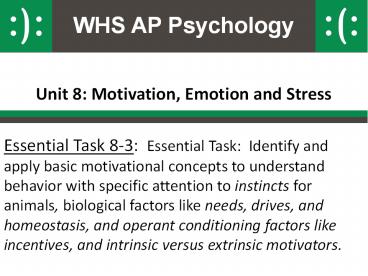Unit 8: Motivation, Emotion and Stress - PowerPoint PPT Presentation
1 / 12
Title:
Unit 8: Motivation, Emotion and Stress
Description:
WHS AP Psychology Unit 8: Motivation, Emotion and Stress Essential Task 8-3: Essential Task: Identify and apply basic motivational concepts to understand behavior ... – PowerPoint PPT presentation
Number of Views:163
Avg rating:3.0/5.0
Title: Unit 8: Motivation, Emotion and Stress
1
Unit 8 Motivation, Emotion and Stress
- Essential Task 8-3 Essential Task Identify
and apply basic motivational concepts to
understand behavior with specific attention
to instincts for animals, biological factors
like needs, drives, and homeostasis, and operant
conditioning factors like incentives, and
intrinsic versus extrinsic motivators.
2
We are here
Explain complex motives (eating, aggression,
achievement and sex)
3
Essential Task 8-3
Outline
- Basic motivational concepts to understand
behavior - Instincts for animals
- Biological factors like
- Drives (Primary vs. Secondary)
- Homeostasis
- Operant conditioning factors
- Incentives
- intrinsic motivators
- Extrinsic motivators
4
Motives vs. Emotions
- Motive
- Specific need or desire, such as hunger, thirst,
or achievement, that prompts goal-directed
behavior - a need or desire that energizes behavior and
directs it towards a goal. - Emotion
- Feeling, such as fear, joy, or surprise, that
underlies behavior
5
Instincts for animals NOT humans.
- Instincts are complex behaviors that have fixed
patterns throughout the species and are not
learned (Tinbergen, 1951).
Outline
6
Humans dont have instincts
- Fell out of favor in psychology
- A Meta-analysis during the height of this craze
found 5759 instincts - Most important human behavior is learned
- Human behavior is rarely inflexible and found
throughout the species - Humans have reflexes but not instincts.
7
Biological Drives (Primary Drives)
- Unlearned drive based on a physiological state
found in all animals - Motivate behavior necessary for survival
- Hypothalamus
- Hunger
- Thirst
- Sex
- Evolutionary biology talks about the four Fs
(fighting, fleeing, feeding and reproducing).
8
Homeostasis explains why we stop fulfilling
biological drives.
- The ability or tendency of an organism to maintain
internal equilibrium or balance. - A state of psychological equilibrium obtained
when tension or a drive has been reduced or
eliminated.
9
Secondary Drives not biologically dictated
- Learned drives
- Wealth
- Success
- Fame
10
Operant Conditioning Factors
- Incentives environmental cues that trigger a
motive. - When a stimulus creates goal-directed behavior
11
Intrinsic Motivators
- Refers to motivation that comes from inside an
individual rather than from any external or
outside rewards, such as money or grades. - It is stronger than external motivation
12
Extrinsic Motivators
- Refers to motivation that comes from external or
outside rewards, such as money or grades.































